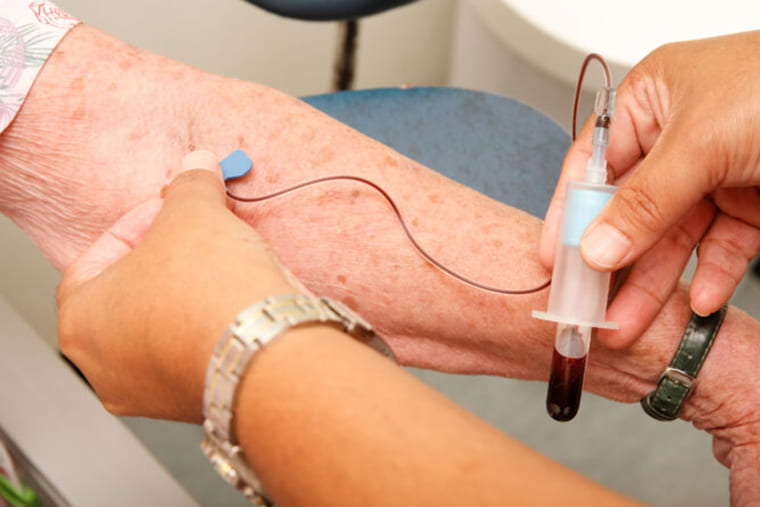A simple blood test to diagnose Alzheimer’s disease soon may replace more invasive and expensive screening methods such as spinal taps and brain scans.
A study by researchers at Washington University School of Medicine in St. Louis and Lund University in Sweden shows that a blood test can be as good at detecting molecular signs of Alzheimer’s disease in the brain as cerebrospinal fluid tests approved by the Food and Drug Administration (FDA) for Alzheimer’s diagnosis. The blood test, which was created by Washington University researchers, uses a highly sensitive technique to measure levels of Alzheimer’s proteins in the blood.
The research is available Feb. 21 in Nature Medicine.
The findings demonstrate that a blood test can diagnose Alzheimer’s disease pathology as accurately as cerebrospinal fluid tests and brain scans, even in patients with mild symptoms, and can be used to detect molecular signs of Alzheimer’s disease in the brain when symptoms haven’t yet emerged.
Identifying people with the disease has become vitally important, as the first Alzheimer’s treatments capable of slowing the disease’s progression recently became available to patients, and other promising drugs are in the pipeline. Such drugs might be more effective when started sooner rather than later, making it critically important to identify people with the disease early.
“The accuracy of this blood test now enables us to diagnose the presence of Alzheimer’s disease pathology with a single blood sample,” said co-senior author Randall J. Bateman, MD, the Charles F. and Joanne Knight Distinguished Professor of Neurology at Washington University. “This advance will increase accurate diagnoses for many patients.”
For many years, Alzheimer’s was diagnosed symptomatically, after people began showing signs of memory and thinking problems. But studies have shown that up to a third of people diagnosed with Alzheimer’s based on cognitive symptoms alone are misdiagnosed and that their symptoms are due to other causes. Consequently, before a patient is eligible to receive Alzheimer’s therapies, a diagnosis of cognitive impairment must be coupled with a positive test for amyloid plaques, which are unique to Alzheimer’s disease. Amyloid positron emission tomography (PET) brain scans, cerebrospinal fluid analyses and blood tests can all be used to confirm the presence of brain amyloid plaques, but only for people who already have cognitive symptoms. They are not used by doctors for people without symptoms.
“In the near future, this type of blood test will replace the need for costly and less accessible cerebrospinal fluid and PET imaging tests in specialist memory clinics,” said co-senior author Oskar Hansson, MD, PhD, a professor of neurology at Lund University. “Next, we need to determine if the Alzheimer’s blood test also works in primary care. This is currently being investigated in Sweden.”
Bateman and colleagues previously created the first approved blood test for amyloid in the brain. The test uses mass spectrometry to measure the ratio of two forms of amyloid in the blood, and it received a “Breakthrough Device” designation from the FDA in 2019. Bateman, co-first author Nicolas Barthélemy, PhD, an assistant professor of neurology at Washington University, and colleagues have since created a second blood test based on the effects of amyloid accumulation on a second brain protein: tau. The presence of amyloid in the brain changes the levels of various forms of tau protein in the brain and in the blood. Measuring the ratio of phosphorylated tau-217 (ptau-217) and unphosphorylated tau in the blood reliably reflects brain amyloid levels. A test combining the amyloid and tau blood measures is marketed by the Washington University startup C2N Diagnostics, as PrecivityAD2.
In this study, a research team led by Bateman, Hansson, Barthélemy, co-first author Gemma Salvadó, PhD, a postdoctoral fellow at Lund University, and co-author Suzanne Schindler, MD, PhD, an associate professor of neurology at Washington University, compared the abilities of four tests to identify people with amyloid in their brains: the ptau-217 blood test and three FDA-approved cerebrospinal fluid tests. They evaluated the tests using blood and cerebrospinal fluid samples from volunteers in the Swedish BioFINDER-2 (Biomarkers For Identifying Neurodegenerative Disorders Early and Reliably) cohort (1,422 people), and Washington University’s Charles F. and Joanne Knight Alzheimer Disease Research Center (Knight ADRC) cohort (337 people). Both groups included people with very mild and mild cognitive symptoms, as well as healthy people for comparison. The tests’ accuracy rates were calculated by comparing their results to the gold standard: PET brain scans for amyloid and tau tangles.
